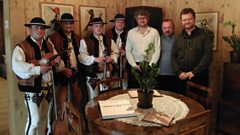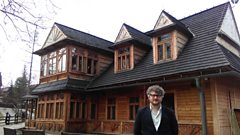Karol Szymanowski
As the Royal Opera House prepares its new production of King Roger, Karol Szymanowski's powerful last opera, Tom Service travels to Poland to explore the life of the most celebrated Polish composer of the 20th century.
Last on
More episodes
Clips
-
![]()
Robbers Song, from Szymanowski's Harnasie
Duration: 01:17
-
![]()
Robbers Dance, from Szymanowski's Harnasie
Duration: 01:31
-
![]()
Tom Service at Villa Atma in Zakopane, Poland
Duration: 01:20
KAROL SZYMANOWSKI

This month the Royal Opera House presents Karol Szymanowski's powerful last opera King Roger, in a new production directed by Kasper Holten and conducted by Antonio Pappano, with the Polish baritone Mariusz Kwiecien in the title role. In this edition of Music Matters, Tom Service travels to Poland to explore the life and music of the most celebrated Polish composer of the 20th century, and discovers how Szymanowski’s operatic masterpiece symbolises one of the central themes in the composer’s life, a struggle between human reason and sensual desire.
Karol Szymanowski was born into a wealthy land-owning Polish family in Tymoszowka, in what is now Ukraine. He studied music with his father, and at the State Conservatory in Warsaw. Musically, his influences spanned the Romantic German school of Wagner and Strauss, the works of Russian composers Scriabin and Stravinsky, and the French impressionism of Debussy, but he was also hugely influenced by the mystical and oriental music he encountered during his travels to North Africa and the Middle East. His works, the most well-known of which include his third symphony ‘The Song of the Night’ and the first of two violin concertos, demonstrate Szymanowski’s desire to create music which celebrates Polish values yet speaks to a universal audience.
Throughout his life, Szymanowski was also fascinated by the folk music of Poland, and developed a strong association with the town of Zakopane in the foothills of the Tatra Mountains, where he often visited friends, and spent his final years in a rented house, Villa Atma (Sanskrit for ‘Soul’). His most directly folk-influenced work, the ballet-pantomime Harnasie, was written in that final period of his life. At Villa Atma, now a museum dedicated to Szymanowski’s life and works, Tom is joined by the writer and Polish Radio host Alek Laskowski, and local guide Maciej Krupa. The music which Szymanowski quoted in Harnasie is brought alive in the house by group of local musicians, who maintain the region’s folk traditions as the composer himself would have heard.
In Krakow, 70 miles north of Zakopane, Tom meets two of those teaching a new generation about Szymanowski and his legacy for Polish music at the Academy of Music, the musicologist Malgorzata Janicka-Slysz and violinist Kaja Danczowska, who feels a strong connection with the composer through her mentor Eugenia Uminska. And the Canadian-born pianist Janina Fialkowska, who was mentored by Arthur Rubinstein, for whom Szymanowski wrote many of his piano works, explains the music’s technical challenges, and why it still appeals to today’s audiences.
More information:
��
��
��
��
��
Credits
| Role | Contributor |
|---|---|
| Presenter | Tom Service |
| Interviewed Guest | Aleksander Laskowski |
| Interviewed Guest | Malgorzata Janicka-Slysz |
| Interviewed Guest | Kaja Danczowska |
| Interviewed Guest | Janina Fialkowska |
| Interviewed Guest | Antonio Pappano |
| Interviewed Guest | Kasper Holten |
| Interviewed Guest | Mariusz Kwiecien |
Broadcast
- Sat 25 Apr 2015 12:15�鶹�� Radio 3
Featured in...
![]()
Composer portraits—Music Matters
Radio 3's Music Matters introduces composers
Knock on wood – six stunning wooden concert halls around the world
Steel and concrete can't beat good old wood to produce the best sounds for music.
The evolution of video game music
Tom Service traces the rise of an exciting new genre, from bleeps to responsive scores.
Why music can literally make us lose track of time
Try our psychoacoustic experiment to see how tempo can affect your timekeeping abilities.
Podcast
-
![]()
Music Matters
The stories that matter, the people that matter, the music that matters






